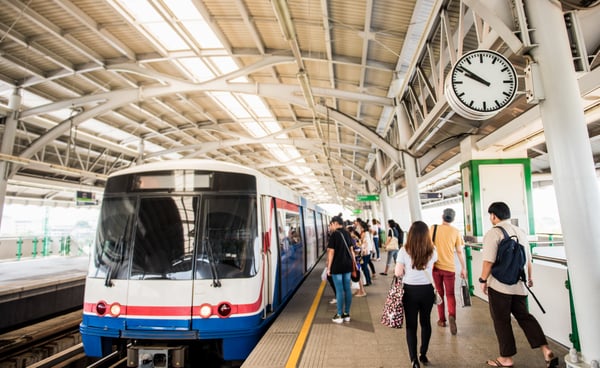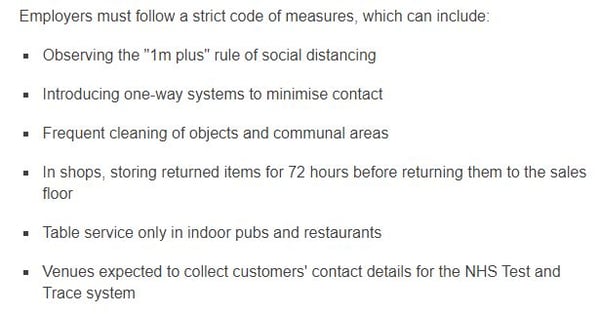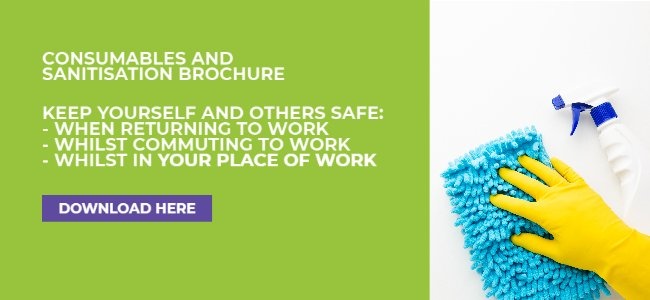Since Boris Johnson announced the lockdown measures across the UK on March 23rd, 2020, life as we knew it has been majorly changed. As a nation, we have been asked to stay in doors as much as possible, isolate from our family and friends and even stop visiting gyms and restaurants, ultimately all to help stop the spread of the Coronavirus.
Since that date, the rules have been adjusted and readjusted appropriately in response to the Coronavirus. One constant throughout that time being pushed by the government is getting the UK population back into full time work as soon as possible. Although a Furlough Scheme has been offered for those companies that need help, the government has asked companies to bring staff back into work as the Furlough Scheme, although it was extended, is now planned to finish at the start of October.
This will mean that all employees will soon be back in full time work. How have people and companies coped returning to work since COVID-19?

Why we must return to work?
With the threat of Coronavirus still looming large, why should the government be pushing for people in the UK to be returning to work? Although, it would be an ideal situation for people to remain at home to help stop the spread of the disease until we can find a cure or a vaccine, it is not a feasible option for the government.
Since the start of the lockdown the UK economy has taken a significant hit. In the “Coronavirus and the impact on output in the UK economy: April 2020” article published by the government, it is highlighted that the economy has experienced a significant shock since the start of the coronavirus (COVID-19) pandemic; GDP has fallen dramatically, with record broad-based falls in output for production, services and construction.
Encouraging and now forcing businesses to bring their staff back into full time work will help improve the significant down-turn on the economy. Not only will businesses now be urged to work to their full potential as before lockdown, the increased traffic and activity of people working a normal day, will boost restaurants, public transport, and other industries.

What is the big deal with returning to work?
Many people have raised the question, 'what is the big deal with returning to work?' Although for some, it does not seem like a daunting task, for many it raises a host of issues and worries. These include:
- Risk of catching the virus
- Putting stress on our NHS and essential workers
- Anxiety and mental health
For many, the risk of catching the virus is a major issue. If you are an unhealthy, old, or a vulnerable individual, the chances of serious health implications or death are much higher. Catching the virus alone is a huge threat.
There is also the possibility of putting too much pressure on our NHS and other essential workers supporting our country. If we all return to work, we may see a spike in COVID-19 cases that our infrastructure cannot deal with.
Lastly, it is important to consider the mental health of many employees returning to work. The added stresses of a global pandemic are not to be taken lightly. Through the lockdown period, many individuals have suffered from anxiety or depression. Forcing an individual to return to work whilst they are not in a fit mental state will have repercussions on their personal life.
What measures have been put into place to help people and companies cope?
The government have enforced guidelines and measures that each employer must implement for their employees. These are detailed in a post by the BBC as seen below:

Further preventative measures include:
- Measuring staff’s temperature before allowing them onsite.
- Creating hand sanitisation stations.
- Wearing face covering whilst moving around the building.
Through the implementation of the guidelines and preventative measures companies have been able to create a much cleaner and safer environment for their people to return to. Although the risk of the Coronavirus spreading is not eliminated, it is drastically reduced.
How have people and companies coped since returning to work?
So, how have people and companies coped since returning to work? Ultimately, it has been a success for many businesses.
By following the guidelines set by the government in order to create a safe and COVID-19 secure environment, organisations have been able to create a safe work environment to help keep the mental well-being of their employees as stable as possible.
Many employees have been happy to return to the office and work full time again, knowing that they can be productive and not worry whilst doing so. We gathered a quote from Sam Brooke, a Graphic Designer at 07 Heaven Marketing, he has this to say: “We returned to the office full time since the start of September. I felt safe doing so knowing that the office would not be overcrowded and that it was regularly being cleaned.”
As long as businesses continue to work to the government guidelines and focus their efforts in creating a safe and COVID-19 secure environment, people returning to the working environment should have the best chance in doing so happily.

